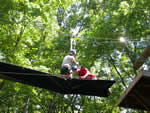Programming
In talking with many families, programming seemed to be less of a concern than was staffing or camper care. However, this component is still a critical one in assessing the “fit” of the camp to your child’s needs, interests, and abilities.
- What type of programming does your camp offer?
- Camp programming varies greatly. Today there are almost as many types of camps as there are types of people! There are horseback riding camps, computer camps, water sport camps, and so on. One of the most important factors in determining a camp is your child’s own interests. Does he or she love sports? Outdoor activities? Animals? Many camps specialize in certain programs while others offer exposure to many different types of activities. This is true whether the camp is day, residential, specialty, or inclusive camp.
Return to top - Does my child get any choice of the activities in which they participate?
- Camps have many different systems in place to support activity participation. Depending on the type of camp, its staffing structure and activities, kids may have a great deal of choice in what they participate in versus what they do not. Most camps however will have a philosophy of “exposure to the new” meaning they will encourage your child to try things that they have perhaps never tried before. They should also be sensitive to “challenge by choice,” meaning they will encourage participation, but not force. Talk with the director about their activity choices and their philosophies relating to programming.
Return to top - What if my child cannot participate in an activity due to their physical restrictions?
 Often times due to the disability or chronic illness itself, as a parent you may not want your child participating in a certain program or activity. Your physician may also advise against participation in certain activities. This is where it is very important for the camp to have several systems in place. One is an application where you should be able to share your child’s activity interests as well as your child’s fears or disinterest in certain activities. The camp should also have very clearly disclosed to you in its marketing materials (brochures, flyers, etc.) the types of activities they offer and of which your child may participate. You should have the option as a parent to sign an “Informed Consent for Program Participation” form where you can clearly state any activities in which you wish your child not to participate or criteria to participate (such as must wear personal floatation device when swimming in lake or pool). This information should then be clearly disseminated to staff to ensure compliance.
Often times due to the disability or chronic illness itself, as a parent you may not want your child participating in a certain program or activity. Your physician may also advise against participation in certain activities. This is where it is very important for the camp to have several systems in place. One is an application where you should be able to share your child’s activity interests as well as your child’s fears or disinterest in certain activities. The camp should also have very clearly disclosed to you in its marketing materials (brochures, flyers, etc.) the types of activities they offer and of which your child may participate. You should have the option as a parent to sign an “Informed Consent for Program Participation” form where you can clearly state any activities in which you wish your child not to participate or criteria to participate (such as must wear personal floatation device when swimming in lake or pool). This information should then be clearly disseminated to staff to ensure compliance.ACA states the following in terms of Activity Information and Permission: Consent for minors to participate should be based on an informed understanding of the activities in which the camper will be participating. Camps may publish information about typical activities in a brochure or in a pre-camp packet, for example. Activities that are not generally familiar to parents, such as rock climbing or rafting, should be noted in verbal or written information about the camp, before permission to participate is gathered.
Return to top- How are the programs or activities supervised?
- Appropriate supervision of activities and programs is critical to safety. Be sure to ask the director how staff are trained to lead activities and how they are evaluated. Pay special attention to “specialized” activities such as waterfront, archery, and horseback riding when offered.
Return to top - What type of adaptive equipment is available?
- Depending on the type of camp, there may be resources available to your child from adaptive balls to adaptive bikes. A camp may have a strong-arm grip for use in archery or a nada chair, a mesh-type woven chair for supporting a camper to sit on the beach at the water’s edge. Adaptive equipment is not limited to recreational activities but may also include adaptive equipment to assist in meeting your child’s care needs, such as eating or toileting. It is always a good idea to ask the director what adaptive equipment the camp has and if it is acceptable for you to send your own to the camp if deemed necessary. You may also want to ask the director about use and storage of adaptive equipment, especially if you chose to send your own, recognizing the expense and care needs of such important devices.
Return to top
